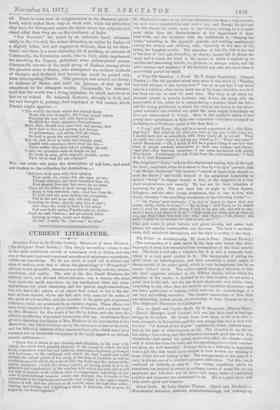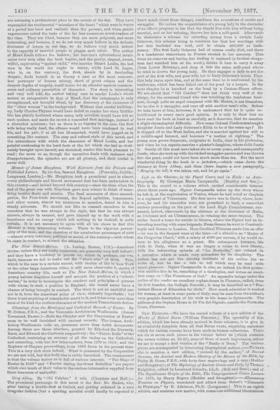are assuming a predominant place in the novels of the
day. They have superseded the sentimental " mistakes of the heart " which were in vogue at a period less hard and realistic than the present, and when gentle Vagnenesses suited the taste of the far less numerous novel-readers of the time. They are liked, because they are more poignant, and more interesting, and because, if we do not very much believe in the delicate distresses of lovers in our day, wo do believe very much indeed in the capacity of married people to plague each other. The author of Maud Leslie follows the fashion ; her heroine's spinsterhood termi- nates very soon after the book begins, and the pretty, elegant, sweet, wilful, captivating "spoiled child," who:marries Stuart Leslie, the last man in the world she ought to marry, while Lord St. Leger, who is, on the contrary, the first, stands by in foreboding despair, finds herself in as thorny a nest as the most remorse- less portrayer of human misery, short of great crimes and the deepest depths of tragedy, could desire for an offender against common- sense and ordinary perception of character. The story is interesting and very well told, the author taking care to render Leslie's whole nature so antagonistic to that of Maud, that the catastrophe is only strengthened, not brought about, by her discovery of the existence of the " other woman " in the background. Without that careful building- up, Lady Charles Thynne would have failed to render her story lifelike. She has plainly hesitated where many lady novelists would have felt no such qualms, and made the secret a concealed first marriage, instead of a discarded mistress ; but as there is no bigamy in the case, the first wife being really dead, the offence would have been condoned in real life, and the pair, if at all less ill-assorted, would have jogged on in something like content. The easy and refined style of this novel, and the naturalness with which the character of Maud Leslie, and her painful awakening to the hard facts of the lot which she had so obsti- nately brought upon herself, are sketched, render this book pleasant to read ; the more so as, though the narrative deals with rashness and disappointment, the episodes are not all gloomy, and their recital is never dull.







































 Previous page
Previous page